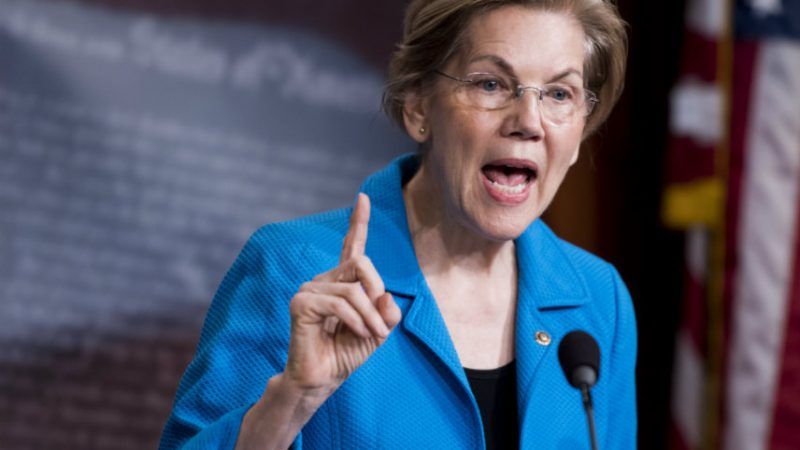On Marijuana, Elizabeth Warren Discovers She Agrees With Clarence Thomas
More signs of the coming left-right convergence on marijuana legalization.

Elizabeth Warren, meet Clarence Thomas.
Senator Warren (D-Mass.) is in the headlines for joining with Senator Cory Gardner (R-Colo.) to introduce the Strengthening the Tenth Amendment Through Entrusting States Act. That legislation would, as Warren put it in a tweet, "let states, territories, & tribes decide for themselves how best to regulate marijuana—without federal interference."
Justice Thomas is Warren's natural ally on the issue. He wrote an emphatic dissent in the 2005 Supreme Court case Gonzalez v. Raich. Gonzalez was President George W. Bush's attorney general Alberto Gonzalez, and Angel Raich is an Oakland, Calif., woman who used locally grown marijuana for medical reasons.
The dissent by Thomas focused not on the advantages or disadvantages of marijuana use but on the Commerce Clause of the Constitution. That clause states, "The Congress shall have Power…To regulate Commerce with foreign Nations, and among the several States."
The Thomas dissent begins: "Respondents Diane Monson and Angel Raich use marijuana that has never been bought or sold, that has never crossed state lines, and that has had no demonstrable effect on the national market for marijuana. If Congress can regulate this under the Commerce Clause, then it can regulate virtually anything—and the Federal Government is no longer one of limited and enumerated powers."
Justice Thomas went on: "Respondents' local cultivation and consumption of marijuana is not 'Commerce…among the several States.' By holding that Congress may regulate activity that is neither interstate nor commerce under the Interstate Commerce Clause, the Court abandons any attempt to enforce the Constitution's limits on federal power."
As Thomas pointed out, "When agents from the Drug Enforcement Administration raided Monson's home, they seized six cannabis plants. If the Federal Government can regulate growing a half-dozen cannabis plants for personal consumption (not because it is interstate commerce, but because it is inextricably bound up with interstate commerce), then Congress' Article I powers—as expanded by the Necessary and Proper Clause—have no meaningful limits."
One of the first columns I wrote after the 2016 presidential election was headlined "The Left Discovers Devolution." It began, "It took an election that gave the Republican Party control of the White House, the Senate and the House of Representatives, but at long last the American left is starting to discover the virtues of devolving authority to state and local governments."
Warren's marijuana bill is a fine example. The left now loves states' rights, or city's rights, when it comes to immigration ("sanctuary cities") and marijuana. Some state and local governments are also raising minimum wages, restricting access to firearms, or taking environmental measures such as banning plastic bags.
Yet the left's support for local control is highly situational. When Republicans suggest that matters such as, say, abortion rights, or marriage equality, might be better resolved at state levels, Democrats object.
The Constitution is a useful guide here. It specifies some matters—slavery, in the 13th Amendment; the right to vote regardless of gender, in the 19th Amendment—that are not up to state or local governments but that are uniform on a national basis. As the Tenth Amendment puts it, "The powers not delegated to the United States by the Constitution, nor prohibited by it to the States, are reserved to the States respectively, or to the people."
As Justice Thomas realized back in 2005, the question of marijuana regulation offers an opportunity to revisit the entire misguided history of Commerce Clause jurisprudence that goes back to Wickard v. Filburn (1942) and even before that to the Shreveport Rate Cases (1914). In those cases, the Supreme Court held that the Constitution's Commerce Clause gave the federal government the power to control how much wheat a farmer could grow for his own consumption on his own farm, and the prices set by railroads, even if the wheat farm or the railroad were entirely within the boundaries of a single state.
Senator Warren, who was a Harvard law professor before she became a professional politician, hasn't exactly established a reputation for deferring to the states. The federal Bureau of Consumer Financial Protection that she championed arguably duplicates the work of state attorneys general. The Obamacare law she defends is a case of Washington imposing its will on state health insurance markets.
Perhaps the cannabis issue can bring Senator Warren to a strict construction of the Commerce Clause and an appreciation of the Tenth Amendment as a matter of general principle, rather than on this one particular issue.
President Trump was asked on Friday about the legislation and his answer was, "I support Senator Gardner. I know exactly what he's doing…We're looking at it. But I probably will end up supporting that, yes."
If President Trump does eventually sign the legislation into law, let him invite Justice Thomas and Senator Warren to the signing ceremony. And in Trump's remarks, let the president quote Thomas's dissent about "limited and enumerated powers." It's potentially relevant to a lot of issues beyond medical marijuana.
Ira Stoll is editor of FutureOfCapitalism.com and author of JFK, Conservative.


Show Comments (46)